Press Reviews
January 2022
International Media Digest
WEST-RUSSIA CRISIS HAS A SIGNIFICANT IMPACT ON THE BALKANS
The current Ukraine crisis and the risks related to a potential Russian invasion are having a substantial impact also on the Balkans. In the region, the growing tensions between the United States, Europe, and Russia have echoed in different forms in January, strengthening existing divisions among NATO countries and pro-Russian governments. The crisis could also exacerbate Balkan countries’ tensions and internal political tensions in the area.
The ongoing crisis, dubbed by analysts as one of the worst since the end of the Cold War, has been exacerbated since last November after information on a new Russian military build-up near the Russian-Ukrainian border emerged. Meanwhile, US intelligence warned that Moscow could be planning an offensive against Ukraine in 2022. Russia denies it is planning an invasion. The main objective of Moscow appears to be to keep Ukraine as much as possible out of the Western area of influence. “For us, it is mandatory to ensure Ukraine never, ever becomes a member of NATO,” said Russian Deputy Foreign Minister Sergei Ryabkov. Moscow is also accusing NATO countries, particularly the US, to pump weapons and military material into Ukraine.
Diplomatic options are still open and broad negotiations to overcome the crisis appear ongoing. Still, the Russian stance has prompted confusion and uproar also among NATO member countries in the Balkans, increasing the risk of a broader destabilization in Europe and beyond.
Actually, Russian demands also impacting parts of the Balkans and it is worthwhile to look closely at the texts. On January 21, the Russian Foreign Ministry illustrated its requests to the West. “It is urgently necessary to launch a serious, substantive dialogue, and the United States and its allies must also take concrete steps to provide reliable security guarantees to Russia. NATO’s continued aggressive activities on the eastern flank and its hostile moves towards Russia,” including “the military development of Ukrainian territory, [that] are unacceptable,” the Ministry stated. Moscow made clear three main points for negotiations with the West. “NATO must abandon its expansion plans, it must not deploy attack weapons systems near Russia’s borders, and the bloc must return to the configuration that existed at the time of the signing of the Russia-NATO Founding Act in 1997” the Ministry noted. (For the text see: https://www.nato.int/cps/su/natohq/official_texts_25468.htm ).
The latest reference relates to the demands of the Kremlin to put an end to the eastward expansion of NATO, which saw 13 Central- and Eastern European countries joining the Alliance since 1997. Several countries from the Balkans, such as Slovenia, Croatia, Montenegro, Albania, North Macedonia, Romania and Bulgaria, joined NATO after 1997. Moscow asks the “withdrawal of foreign forces, equipment, and weapons, as well as taking other steps to return to the set-up we had in 1997 in non-NATO countries. This includes Bulgaria and Romania,” Russia said.
The Russian requests caused a significant uproar among NATO members, particularly in Bucharest and Sofia. As a response to Russian demands, NATO announced that Alliance’s member countries will be “sending additional ships and fighter jets to NATO deployments in eastern Europe, reinforcing Allied deterrence and defence as Russia continues its military build-up in and around Ukraine.” “NATO will continue to take all necessary measures to protect and defend all Allies, including reinforcing the eastern part of the Alliance. We will always respond to any deterioration of our security environment, including through strengthening our collective defence,” said NATO Secretary-General Jens Stoltenberg. In a separate interview, Stoltenberg said that NATO would never withdraw troops from Eastern Europe.
“Bulgaria is a sovereign country, and we have long made our choice by becoming a member of NATO” and “we decide alone how to organize the defence of our country in coordination with our partners,” said the new Bulgarian Prime Minister, Kiril Petkov. However, Petkov also said that dialogue is needed to solve the crisis.
The Romanian Foreign Ministry said that Moscow’s requests are “unacceptable”, noting the NATO presence in Romania and Eastern Europe is “a purely defensive reaction to Russia’s increasingly aggressive behaviour in the eastern vicinity”. Romania is hosting the ‘Aegis Ashore’ missile defence site, a powerful system designed against ballistic missiles operated by the US on NATO’s behalf and considered a “direct threat” by Moscow, although its NATO officially stated function is to protect European NATO Allies and US deployed forces in the region against the growing threat posed by the proliferation of ballistic missiles outside the Euro-Atlantic area. In Romania, NATO is present also with a 4.000 multinational land force, while the US have troops at the strategically crucial Deveselu base (the same of the Aegis Ashore Ballistic Missile Defence).
However, not all countries in the Balkans followed the relatively firm steps of Romania and Bulgaria, confirming that the region remains deeply divided between West and East and that the Russian influence in the area is robust.
Serbia, which aspires to enter the EU but defends its traditionally strong ties with Moscow, did not openly take a side during the ongoing crisis. The same happened in Montenegro, lately lurching back into a severe political crisis. Podgorica, which became the 29th member of NATO in 2017, remains deeply divided among pro-Russian and pro-Serbian political movements and pro-Western parties. On the other side, Kosovo and North Macedonia, the latter also a NATO member, offered support to NATO in case of a deterioration of the crisis.
In Croatia, a NATO member, President Zoran Milanovic, caused a major diplomatic crisis by saying that Ukraine, one of the “most corrupt countries in the world, does not belong in NATO.” The crisis “is happening in the antechamber of Russia (and) one must reach a deal that will take account of the security interests of Russia,” Milanovic noted, provoking outrage in the Croatian government and Ukraine.
THE US IMPOSES SANCTIONS AGAINST DODIK, EU STILL ON STANDBY
While the political crisis in Bosnia and Herzegovina (BiH) seems to have stalled, not exacerbating nor heading towards a definitive solution in the previous weeks, the United States decided nonetheless to mobilize itself for a de-escalation. To do so, the Biden administration announced new sanctions against the Bosnian Serb leader Milorad Dodik, currently the Serbian member of the BiH tripartite Presidency and the principal architect of the crisis.
The crisis is probably the most serious since the end of the conflict in the Balkan country. It began in summer 2021 when the outgoing High Representative Valentin Inzko decided to introduce a law that punishes acts of publicly denying the genocide in Srebrenica and other war crimes committed in Bosnia during the last war. Dodik, who has been advocating the separation of the Republika Srpska (RS) for years, read the move as an attempt to define the entire Serbian people as genocidal. As a countermeasure, the leadership of RS announced a boycott of the central institutions by Bosnian Serbs representatives. Subsequently, in December 2021, the RS Parliament voted to withdraw the Bosnian Serbs representatives from the joint Indirect Tax Administration (ITA), the central High Judicial and Prosecutorial Council (HJCP) and even from the Armed Forces of Bosnia and Herzegovina. The withdrawal might happen in the next six months, leading to a de-facto secession.
While there are signs that Dodik might backtrack after the informal and controversial moratorium on withdrawal, the US decided nevertheless to sanction Dodik, claiming at the same time that his pseudo-secessionist moves are just a smokescreen to hide alleged “corrupt activities,” the US Department of Treasury claimed.
In what was the first designation issued under President Joe Biden’s executive order of June 2021, which allows blocking all US-based property owned by those destabilizing in the Western Balkans, Dodik and some of his associates were sanctioned for “corrupt activities and continued threats to the stability and territorial integrity of BiH,” Washington said. “Dodik has undermined BiH institutions by calling for the seizure of state competencies and setting in motion the creation of parallel institutions in BiH’s Republika Srpska (RS) entity,” the order reads. “Dodik has used his official BiH position to accumulate personal wealth through graft, bribery, and other forms of corruption,” Washington accused. The Bosnian Serb leader acted all these months and years to “distract attention from his corrupt activities.”
Furthermore, Dodik “has funnelled money directly from public companies to ATV,” a television network very close to the RS leadership, “for corrupt purposes. Dodik has substantially increased funding for ATV in recent years and engaged in malign social media influence campaigns through ATV to publish content that advances his political and personal goals.” “Milorad Dodik’s destabilizing corrupt activities and attempts to dismantle the Dayton Peace Accords, motivated by his own self-interest, threaten the stability of Bosnia and Herzegovina and the entire region,” explained Brian Nelson, the Undersecretary for terrorism and financial intelligence at the US Treasury.
Although Dodik slammed US sanctions, claiming that they would bring the Bosnian Serbs closer to their “true friends,” Russia and China, the move by Washington isolated further the Bosnian Serb leader on the international level. Sanctions might also force Dodik to make a U-turn in his secessionist threats. Soon after the US sanctions were announced, for instance, the Bosnian Serb leader hinted that the Republika Srpska entity would return to the state institutions once the Serb-majority part of the country is no longer called “genocidal.”
However, differently from the US, the EU has not yet decided on the issue, avoiding deliberate on the topic despite German pressures to sanction Dodik, thus leaving Washington practically alone in trimming down the secessionist ambitions of Dodik.
Nonetheless, new pressures for the EU to target Dodik with sanctions came at the end of January from the European Parliament. European MEPs from all major political groups, including the EPP and the S&D, urged the EU Council, “the Commission and the EEAS to finally abandon their longstanding non-conclusive appeasement strategy towards Dodik.” “Rewarding secessionist and divisive policies send a devastatingly wrong signal to BiH politicians, citizens and the whole region,” MEPs wrote in an open letter. The EU should “follow the example set by the US, and impose sanctions against Milorad Dodik unless he radically changes course and takes concrete steps to de-escalate the current tensions,” the letter reads. Also, the High Representative of the international community in Bosnia, Christian Schmidt, said that “personal sanctions” could be needed and urged the EU to act more swiftly to prevent a “hot conflict” in Bosnia and Herzegovina.
Further News and Views
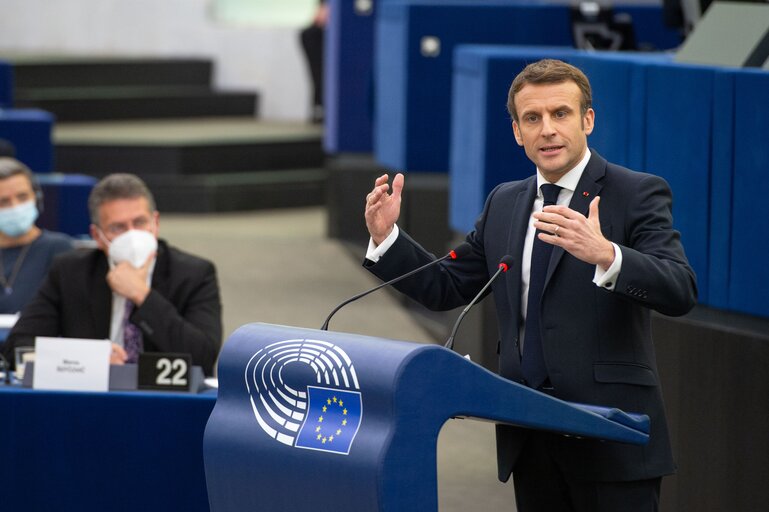
France calls for a firmer EU accession perspective for the region
Slovenia handed over the rotating presidency of the Council of the EU to France in January, with Paris confirming that France will have the Western Balkan region among its priorities during its semester. “The Western Balkans are geographically and historically at the heart of the European continent for their tragic past and a greater future. They have wounds that show us how fragile peace can be and how strong our Union can be,” French President Emmanuel Macron said at a speech at the European Parliament. “That is why today we want to think about our relations with Western Balkan countries and give them a clear perspective of accession to the European Union”, Macron added. “We need to think about our rules again and make them clearer, make them easier so we can decide more quickly and more easily and also be honest about Europe where the Western Balkans have a place,” the French leader underlined.
Slovenian government, European Western Balkans
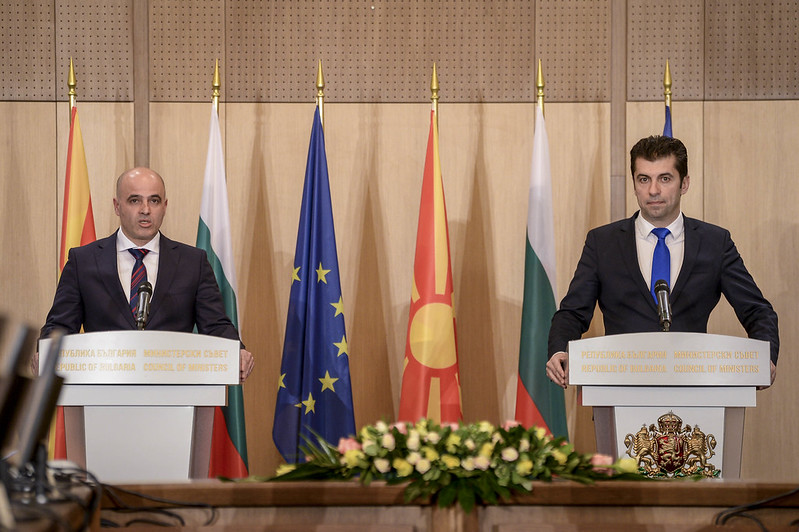
Bulgaria and North Macedonia talk to overcome the veto
The new governments in Bulgaria and North Macedonia met two times in January to defuse tensions and try to overcome the 2019 veto. Sofia decided to stop the EU entry process of Skopje due to disagreements on the protection of the Bulgarian minority, history and language. The new Bulgarian Prime Minister Kiril Petkov and his new North Macedonian counterpart Dimitar Kovacevski said their “common goal” is now “is to create a better future” for both countries. “I’m very optimistic about the new dynamics [in relations] and can assure you that results will be visible every week,” Petkov assured. “There is hope because we have finally heard the magic word ‘compromise’,” said political analyst Ivaylo Ditchev.
Euronews, Deutsche Welle, MSN
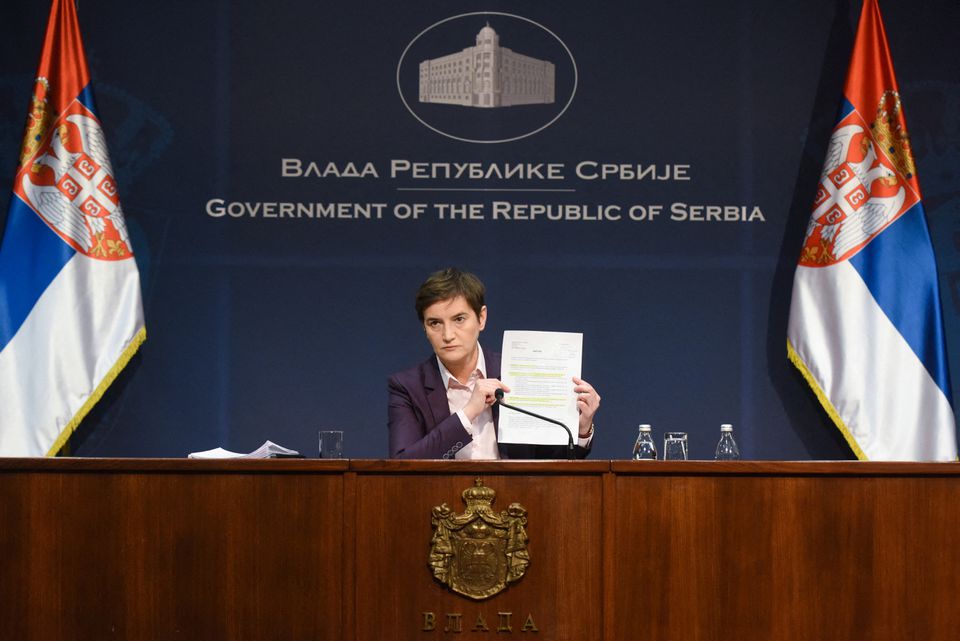
Serbia cancels licence for Rio Tinto lithium project
After months of protests and ahead of the Serbian presidential and general elections of April 3, the government in Belgrade announced the cancellation of all existing permits that allowed the mining giant Rio Tinto to realize a controversial lithium mine in Serbia. “We have fulfilled all the demands from the environmental protests and have put an end to Rio Tinto in the Republic of Serbia,” Serbian Prime Minister Ana Brnabic said in a televised address. Rio Tinto’s shares tumbled in Australia and the United Kingdom following the news, undermining the company’s goal to become one of the biggest lithium producers globally. More than 290,000 signatures were collected against the Rio Tinto project in the country.
Radio Free Europe, BBC, Mining, ABC News
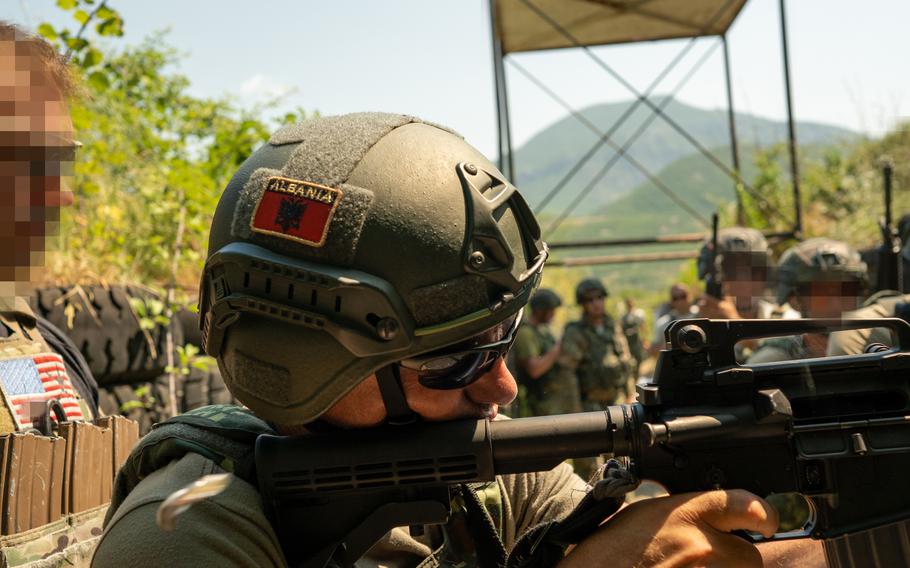
The US chooses Tirana for new special forces base
Albania, which joined NATO in 2009, further strengthened its close relationship with the United States by accepting to host a new US special forces regional base in the capital. “US Special Operations Command Europe has made the decision to locate a forward-based SOF (special operation forces) headquarters, on a rotational basis, in Albania”, thus gaining critical access “to transportation hubs in the Balkans and greater logistical flexibility,” the US. Special Operations Command Europe said. The force could be used to “rapidly respond to emerging threats and, if necessary, defeat aggression” in the region and beyond and will allow NATO and US troops to “move and train within the Balkan.” Allowing the realization of the base is “an expression of a very high credibility and a very close cooperation”, Albanian Prime Minister Edi Rama commented.
Deutsche Welle, U.S. Special Operations Command Europe
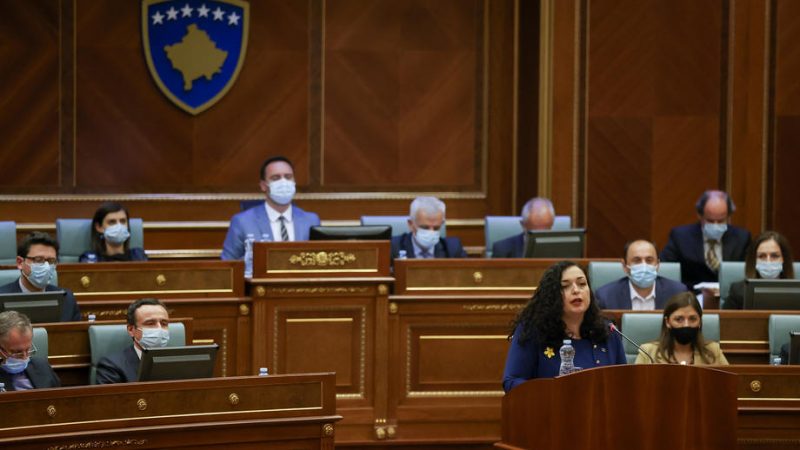
New tensions between Belgrade and Pristina on justice referendum
In January, Serbian voters went to the polls for a constitutional referendum on justice, seen at the EU level as a precondition for the accession of Serbia to the Union. Still, despite pressure from the international community, Serbs in Kosovo were for the first time prevented to vote in a move that paves the way for further tension given the Serbian general and presidential elections of Spring 2022. “We call on the Kosovo government to allow Serbs in Kosovo to exercise their right to vote in elections and electoral processes in accordance with this established practice,” Germany, France, Italy, United Kingdom, United States and the EU said. Letting Serbs in Kosovo vote at the referendum would constitute “a clear violation of the constitution and laws of Kosovo, as well as international practices,” Kosovo PM Kurti and President Osmani replied, adding that Serbs could vote by mail. Belgrade warned that Pristina will not “succeed in banning Serbs in Kosovo from voting, notably in April 3 elections.”
Deutsche Welle, Reuters, ANSA, US Department of State
Monthly Analysis
THE ENERGY SECTOR IN THE BALKANS
IS FACING TOUGH YEARS AHEAD
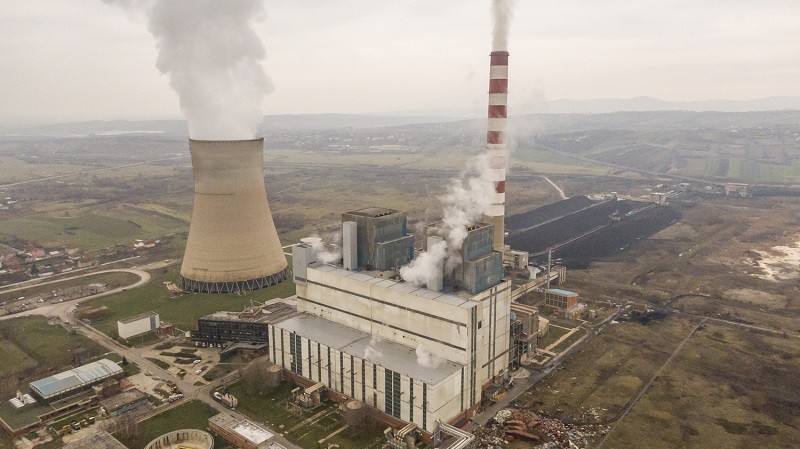
Increasing energy prices, the massive dependence on Russian gas, obsolete mining and outdated productions infrastructure and the path towards decarbonization are some of the elements that could pave the way for a severe energy crisis unfolding soon in the Balkans. Severe disruptions were observed in the region in December and January, showing the potential for more severe problems shortly.
Kosovo, in particular, faced probably the worst energy crisis since its independence, with the government forced to implement emergency measures and scheduled power cuts, particularly damaging for factories and shops. Those events forced Pristina to ban the so-called ‘crypto mining’, a business quite florid in Kosovo, because of the high demand for electricity in the sector.
The problems in the former Serbian province arose primarily due to the obsolescence of the Kosovo B power plant, which suffered severe breakdowns already in December. Kosovo B, the largest lignite-fired power plant in the country, was opened back in 1983. The second power station, Kosovo A, is even older and entered into operation in the 1960s. No significant investments were carried out in the last decades in the two power plants, while a project for building a new power plant was cancelled in 2021. Outdated power plants, fired by brown coal -which contribute to making Kosovo one of the most polluted countries in Europe – combined with the ongoing global energy crisis has increased import prices, forcing Kosovo to import electricity for a price several times higher than in the past.
Around 40% of the households in Kosovo and Albania were already living in energy poverty before the current crisis, 33% in North Macedonia, 7-22% in Serbia, 15% in Montenegro. Households and businesses could also see their bills doubling in the following months. In January, protests against increasing energy prices were already held in Pristina, while demonstrations took place in Albania.
Problems with the energy sector are not limited to Kosovo. In North Macedonia, where the energy crisis was declared already in November, authorities are considering postponing the coal exit deadline from 2027 to 2030 due to increasing gas prices. Serbia, where coal power plants and some distribution network grids are also becoming obsolete, suffered significant disturbances in the electricity supply in December. The main problem in Serbia arose from damages at one of the largest lignite-powered plants due to low-quality coal used and “bad equipment,” authorities said. Albania, which declared a state of emergency due to increasing energy prices in October, is considering restoring a thermal power plant to produce electricity on its own without importing from abroad. Meanwhile, in Montenegro, the aluminium smelter KAP, one of the biggest companies in the country, was forced to shut down due to the energy price hike, leaving 500 people without jobs. Even in Slovenia, almost 40% of the companies said their business is in jeopardy due to rising energy costs. They expect an increase of 128 per cent in this year’s bills.
In general, the region is affected by several negative factors, both internal and external. Concerning gas supplies, Russia oligopolistic or even monopolistic position in some countries might benefit pro-Russian governments in the Balkans, which could be offered – like in the case of Serbia – preferential lower prices and long-term contracts with advantageous conditions. On the other side, Moscow intends to exploit its energy hegemony by increasing its political influence in several countries, including Bulgaria, North Macedonia, Serbia and Bosnia and Herzegovina. Only Romania remains largely independent from Russian gas. In the area, it is still ongoing an indirect clash between the West (pushing for American gas and liquefied natural gas, plus TANAP-TAP pipeline, which could double its capacity to bring non-Russian gas to the Balkans) and Russia (with Turk Stream and Turk Stream 2 to Bulgaria, circumventing Ukraine) over existing and planned gas pipelines and supplies.
Furthermore, in a region that still shares the strategic goal to enter the EU and has one of the highest pollution levels globally, the need for a coal phase-out is becoming more and more urgent. However, the process has high costs, both for states and consumers and could lead to new disruptions and problems in production during the decarbonization process, i.e., the path from the production of electricity from cheap domestic coal to more expensive but greener sources of energy. However, this could be the way to increase energy independence from foreign sources and, at the same time, geopolitical autonomy.
The Insight Angle

SONJA RISTESKA
Project manager for South-Eastern Europe
Agora Energiewende
Kosovo, Serbia and North Macedonia and other countries in the region suffered a severe energy crisis in November and December. Do you think the issues related to electricity production were just temporary, or was that a signal of more structural problems? Are you expecting more troubles in the future?
I’d say it sort of both. No one predicted what happened and since many of the countries in the region are importing, they are affected by the price shocks. However yes, these problems are exuberated by the structural problems they are facing for decades now: old, polluting, inefficient power plants, lack of capital investments, lagging behind the renewables deployment compared to other European countries. Although, for instance, both Serbia and North Macedonia have seen a booming renewable energy sources (RES) markets, many proponents are blaming exactly this for the crisis, where the truth is the opposite: renewables are the least-cost option unlike coal or foreign gas. As for the future, the energy transformation is not a straight-forward road but there should be one thing clear: cheap fossil fuels are the past, the crisis showcased those investments in energy efficiency, cheap solar etc can help bring the prices down.
Most of the countries in the Balkans are still relying on lignite for the production of electricity. Are there any signs that a process of decarbonization might start soon? What the EU and the countries in the Balkans could do to switch faster to more ‘green’ sources of energy?
The process has started. Greece, North Macedonia, Slovenia, Romania all announced their coal phase-out dates. The pressure from outside, as well as from the markets, the pulling of the plug of financing coal from China, rising CO2 prices, introduction of the Carbon Border Adjustment Mechanism for the electricity imports in the EU as well are all going to put pressure and these processes will inevitably accelerate in the years to come. The countries need to plan accordingly, prepare their national strategies and action plans in accordance with the EU targets, remove the last remaining barriers for RES development and integrate into a regional power market. Internal carbon pricing in the Western Balkans is also a necessary step towards a green economy. We must put the right price tag on CO2.
And what kind of energy sources could be used as an alternative in the region, taking into account that ‘green energy’ could also cost more to impoverished customers in the region?
A proper mix, of course. Gas has to be hydrogen ready, with 2050 net-zero target we cannot be talking about new gas infrastructure as a bridge if that one is not ready for a decarbonized future. A renewables-based power system on mainly solar and wind with some hydro storage is a ‘no regret’ strategy for the region. In the Western Balkans replacing the old and inefficient lignite generation by renewables lowers wholesale prices, hedges against carbon prices (when introduced) and avoids that fossil gas infrastructure will become stranded. Also, it is really important to emphasize that renewables deployment can largely be financed from market revenues especially in case of carbon pricing and we do not need to plunge the countries in greater debts.
Do you think the increasing costs of gas could push Balkan countries to stick to coal?
We see some signs pointing into that direction but this is not a long-term solution. With tighter regulation and higher targets, inevitable carbon pricing irrespective if within the region or at the border with the EU, no funding available for the coal projects etc., sticking to business as usual is not going to be a viable option.
The Balkans, Serbia in particular, are also relying on gas supplies from Russia, with Moscow using its role as a major supplier for increasing its political influence in the region. Do you expect this scenario to change in the next years or Russia will remain a key actor in the Balkans?
I do not expect much of a change in the gas relations. The countries should however focus on further expanding their own domestic renewables markets and work towards coupling with their neighbours. This would assist in being less dependent on any imported fossil fuel.

Stefano Giantin
Journalist based in the Balkans since 2005, he covers Central- and Eastern Europe for a wide range of media outlets, including the Italian national news agency ANSA, and the dailies La Stampa and Il Piccolo.

